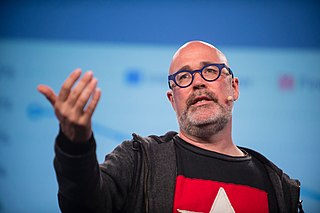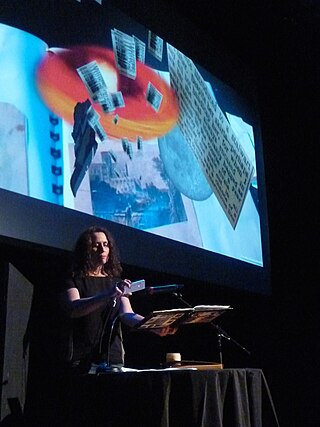The Graduate School and University Center of the City University of New York is a public research institution and postgraduate university in New York City. Formed in 1961 as Division of Graduate Studies at City University of New York, it was renamed to Graduate School and University Center in 1969. Serving as the principal doctorate-granting institution of the City University of New York (CUNY) system, CUNY Graduate Center is classified among "R1: Doctoral Universities – Very High Research Activity".

Katie Salen Tekinbaş is an American game designer, animator, and educator. She is a professor at the University of California, Irvine. Previously, she taught at DePaul University College of Computing and Digital Media, Parsons The New School for Design the University of Texas at Austin, New York University, and the Rhode Island School of Design. She has an MFA in graphic design from the Rhode Island School of Design.

Mizuko Itō, sometimes known as Mimi Ito, is a Japanese cultural anthropologist and learning scientist. She is Professor in Residence and John D. and Catherine T. MacArthur Chair in Digital Media and Learning, and Director of the Connected Learning Lab in the Department of Informatics, Donald Bren School of Information and Computer Sciences at the University of California, Irvine. Her main professional interest is young people's use of media technology. She has explored the ways in which digital media are changing relationships, identities, and communities.

Walter Nickell "Nick" Sousanis is an American scholar, art critic, and cartoonist; a co-founder of the TheDetroiter.com, he is also the first person at Columbia University to write a dissertation entirely in a comic book format.

David Theo Goldberg is a South African professor working in the United States, known for his work in critical race theory, the digital humanities, and the state of the university.
OpenCourseWare (OCW) are course lessons created at universities and published for free via the Internet. OCW projects first appeared in the late 1990s, and after gaining traction in Europe and then the United States have become a worldwide means of delivering educational content.
The Franklin Humanities Institute (FHI) is an interdisciplinary humanities center at Duke University dedicated to supporting humanities, arts, and social science research and teaching. Named after the prominent African American historian and civil rights activist John Hope Franklin, who retired from Duke in 1985 as the James B. Duke professor of history, the institute has also made a commitment to promote scholarship that enhances social equity, especially through research on race and ethnicity.

James Mason Bower is an American neuroscientist and CEO and chairman of the Board of Numedeon Inc., creator of the Whyville.net educational virtual world. He graduated from McQuaid Jesuit High School in Rochester, New York attending Antioch College and Montana State University as an undergraduate and then received his PhD in neurophysiology from the University of Wisconsin–Madison, U.S. in 1982. From 1984 until 2001, he was a professor at the California Institute of Technology and from 2001 until 2013 he was a professor at the University of Texas Health Science Center at San Antonio. At present he is an affiliate professor of biology at Southern Oregon University.

Cathy N. Davidson is an American scholar and university professor. Beginning July 1, 2014, she is a professor at the Graduate Center of the City University of New York.

The School of Humanities is one of the academic units of the University of California, Irvine. Upon the school's opening in 1965, the Division of Humanities was one of the five liberal arts divisions at the campus. Samuel McCulloch was appointed as UC Irvine's founding dean of Humanities in 1963. The School hosts the Thesaurus Linguae Graecae and the University of California Humanities Research Institute.
Quest to Learn (Q2L) is a public middle and high school in New York City. The school is operated by the New York City Department of Education and is located in the Bayard Rustin Educational Complex in the Chelsea neighborhood of Manhattan.
The Walter Chapin Simpson Center for the Humanities, located in Seattle, Washington, is one of the largest and most comprehensive humanities centers in the United States. Housed in the College of Arts and Sciences at the University of Washington (UW), it offers UW scholars a spectrum of local opportunities for intellectual community and grant support that advances crossdisciplinarity, collaboration, and research while networking them nationally and internationally.
Digital badges are a validated indicator of accomplishment, skill, quality or interest that can be earned in various learning environments.
Steve F. Anderson is an American academic. He is a professor of digital media at the UCLA School of Theater, Film and Television. He was previously an associate professor in the USC Interactive Media & Games Division.

Mark Surman is a Canadian open internet activist and the president and executive director of the Mozilla Foundation. He is a leading advocate for trustworthy AI, digital privacy, and the open internet. Before joining the Mozilla Foundation, Mark spent more than 15 years leading organizations and projects promoting the use of the internet and open source for social empowerment in many countries around the world.

Now You See It: How the Brain Science of Attention Will Transform the Way We Live, Work, and Learn is a book by CUNY Graduate Center professor Cathy Davidson published by Viking Press on August 19, 2011.
Kellie Jones is an American art historian and curator. She is a Professor in Art History and Archaeology in African American Studies at Columbia University. She won a MacArthur Fellowship in 2016. In 2023, she was elected to the American Philosophical Society.

Caitlin Fisher is a Canadian media artist, poet, writer, futurist and Professor of Cinema and Media Arts at York University in Toronto where she also directs the Immersive Storytelling Lab and the Augmented Reality Lab. Fisher is also a Co-founder of York’s Future Cinema Lab, former Fulbright and Canada Research Chair, and an international award-winning digital storyteller. Creator of some of the world’s first AR poetry and long-from VR narratives. Pioneer of research-creation who defended Canada's first born-digital dissertation. Member of the early AR artist collective Manifest AR. Fisher is also known for the 2001 hypermedia novel These Waves of Girls, and for her work creating content and software for augmented reality. "Her work is poetic and exploratory, combining the development of authoring software with evocative literary constructs."
Rita Raley is an American researcher who focuses on digital literature. Her research interests include new media, electronic literature, digital humanities, contemporary arts, activism and social practices, tactical media, global English, discourse on globalization, and language and information politics.










